As Japanese forces continued to sweep all before them, on 25 February the internment of Japanese-American citizens living along the Pacific coast of the USA began; over 110,000 people would ultimately be affected. On 27 February an Allied fleet was decisively defeated by the Japanese Navy in the Battle of the Java Sea and ten Allied warships were sunk, leaving the Japanese masters of Indonesian waters. In Russia, the Soviet army began another winter offensive against the Germans, this time in the Crimea.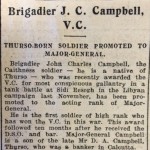
The John O’Groat Journal reported this week that a native son of Thurso, Brigadier John Charles “Jock” Campbell, who had recently been awarded the Victoria Cross “for most conspicuous gallantry in a tank battle at Sidi Resegh in the Libyan campaign last November, has been promoted to the acting rank of Major-General.”
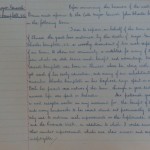 Tragically, on 26 February Major-General Campbell was killed in Egypt in an accident when his jeep overturned. An experienced soldier, he was considered one of the foremost commanders of the Eighth Army and his loss was deeply felt. Thurso
Tragically, on 26 February Major-General Campbell was killed in Egypt in an accident when his jeep overturned. An experienced soldier, he was considered one of the foremost commanders of the Eighth Army and his loss was deeply felt. Thurso 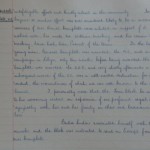 Burgh Council paid tribute to Major-General Campbell and the Provost said, “I personally move that the Town Clerk be instructed to convey to his sorrowing widow an expression of our profound regret and our sincerest sympathy with her and her family in their sad bereavement and irreparable loss.”
Burgh Council paid tribute to Major-General Campbell and the Provost said, “I personally move that the Town Clerk be instructed to convey to his sorrowing widow an expression of our profound regret and our sincerest sympathy with her and her family in their sad bereavement and irreparable loss.”
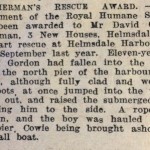 The John O’Groat Journal reported that “the parchment of the Royal Humane Society has been awarded to Mr David Cowie, fisherman, 3 New Houses, Helmsdale, for a smart rescue in Helmsdale Harbour.” Mr Cowie had gone to the rescue of eleven year-old David Gordon, who had fallen in the water from the north pier of the harbour: “Mr Cowie, although fully clad and wearing sea-boots, at once jumped into the water, swam out and raised the submerged boy.”
The John O’Groat Journal reported that “the parchment of the Royal Humane Society has been awarded to Mr David Cowie, fisherman, 3 New Houses, Helmsdale, for a smart rescue in Helmsdale Harbour.” Mr Cowie had gone to the rescue of eleven year-old David Gordon, who had fallen in the water from the north pier of the harbour: “Mr Cowie, although fully clad and wearing sea-boots, at once jumped into the water, swam out and raised the submerged boy.”
Finally this week, the same paper reported the case of some less fortunate boys who appeared in Wick Burgh Court accused of puncturing the tyres of a tricycle belonging to the Pavilion Picture-house. Two young boys aged about nine years were produced as witnesses: “One of the young boys said he had seen one of the accused cutting the tricycle tyres with a knife. He said the accused made him tell lies before, and they would strike him after the Court for telling the truth. They had threatened to do so.” In his rather 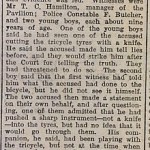 unconvincing defence, one of the accused “admitted that he had pushed a sharp instrument – not a knife – into the tyres, but he had no idea that it would go through them.” The boys were found guilty and put on probation – and warned “if they threatened of the young witnesses they would be severely punished.”
unconvincing defence, one of the accused “admitted that he had pushed a sharp instrument – not a knife – into the tyres, but he had no idea that it would go through them.” The boys were found guilty and put on probation – and warned “if they threatened of the young witnesses they would be severely punished.”
